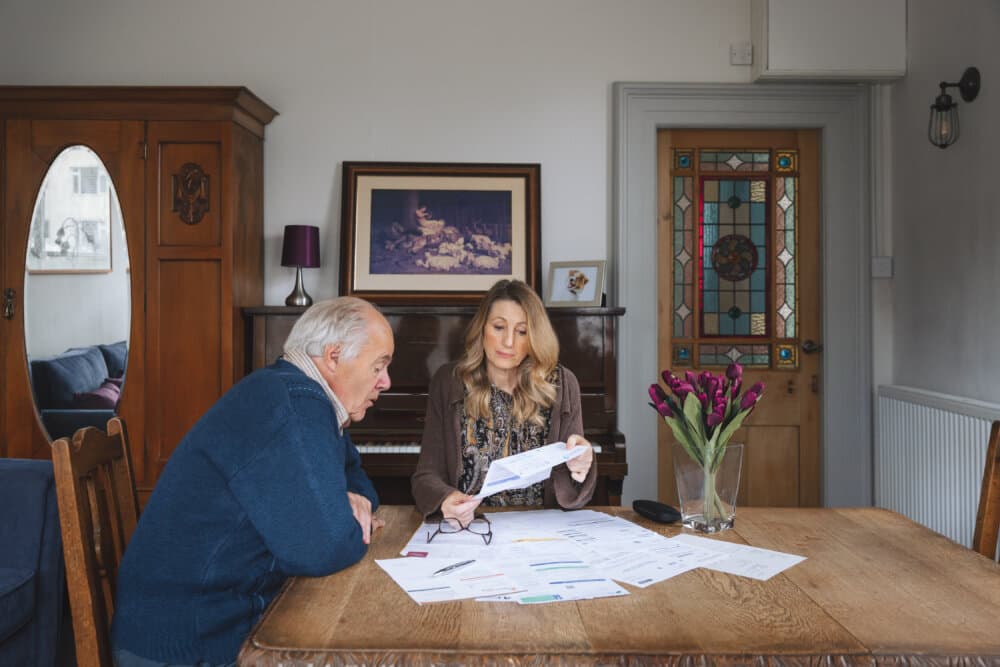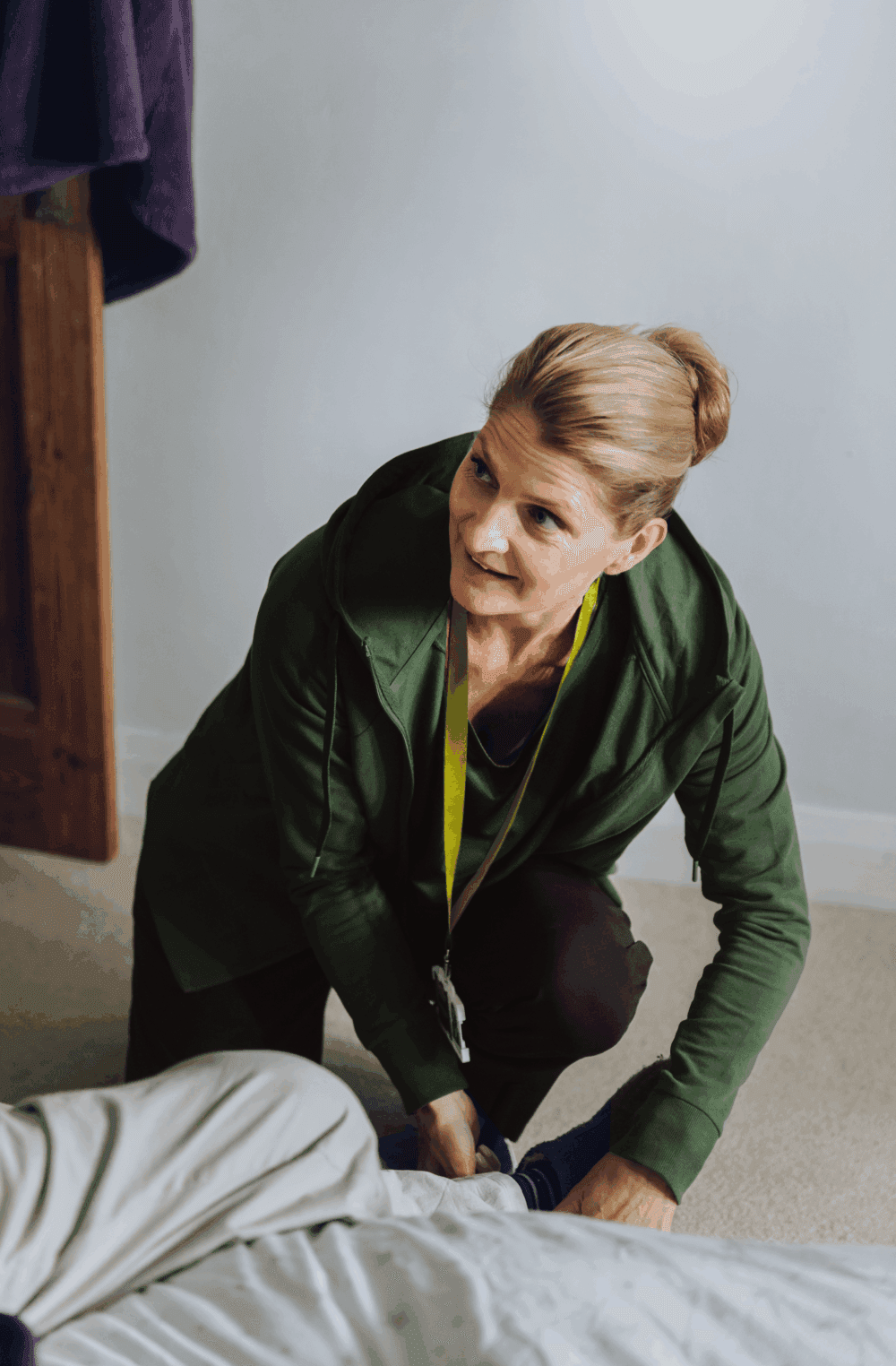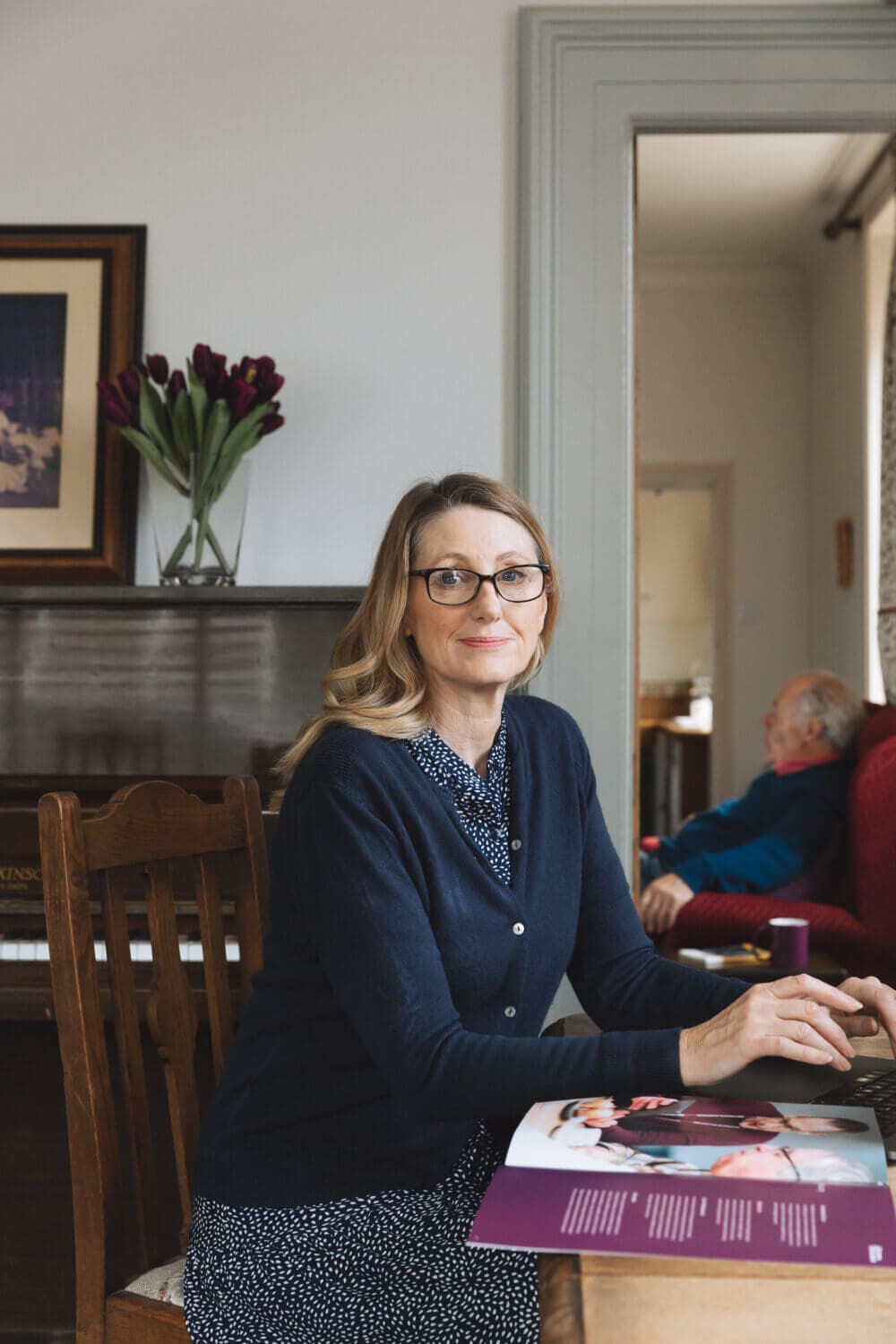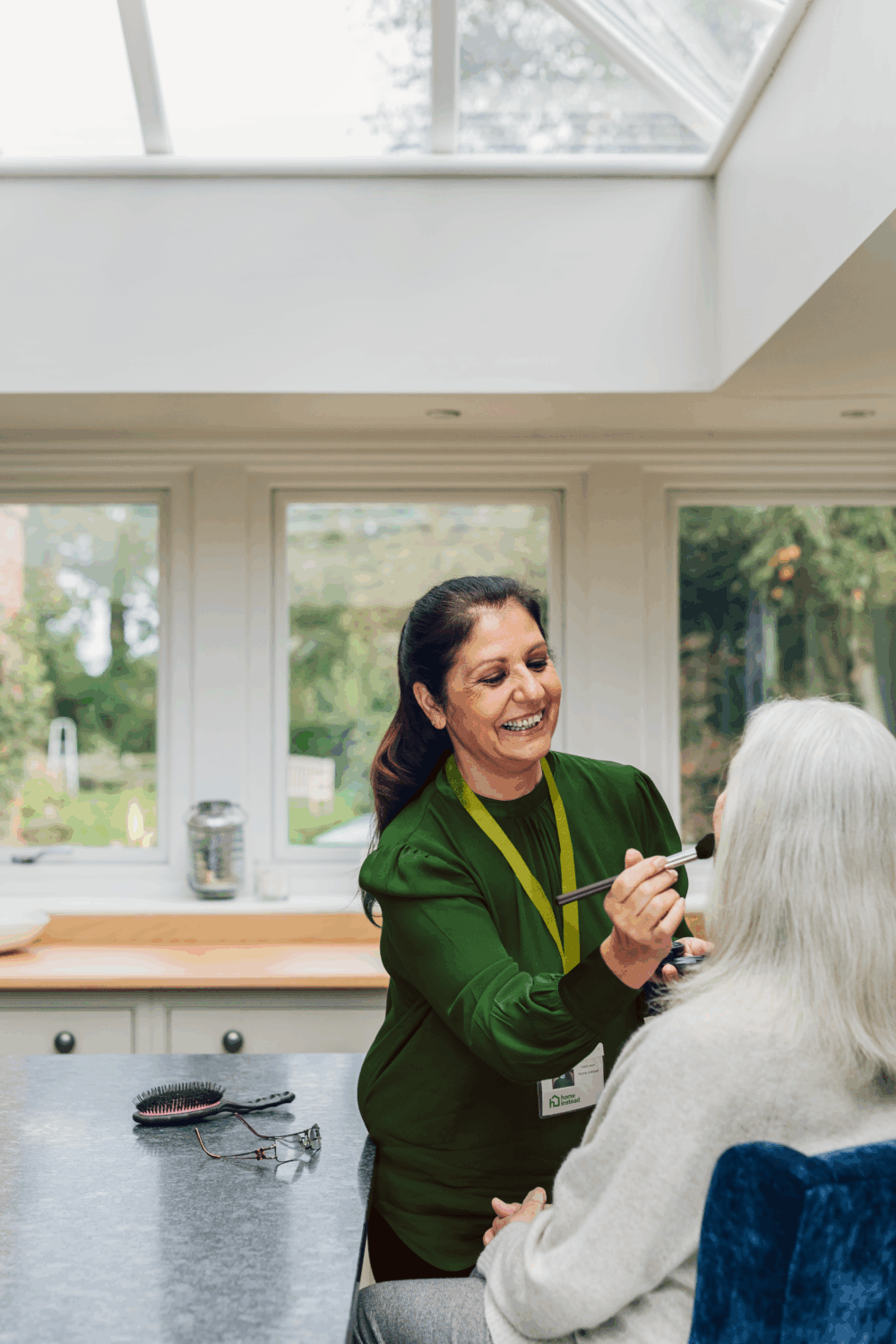How to choose and arrange home care services
We understand choosing and arranging home care services for yourself or a loved one can be an overwhelming process that requires a lot of thought and attention.

Guidance on choosing and arranging home care for ageing adults
Home care can provide an excellent, cost-effective alternative to care homes that is helpful for those looking for additional support with everything from personal care to medical care, so if you are currently looking into the home care options available to you in the UK, you’re in the right place.
At Home Instead, our aim is to help people age positively and in place by bringing expert care to their home. For nearly 20 years, we have been providing the highest standard of care, and creating industry-leading training programmes for our Care Professionals that are accredited by nursing and medical professionals. Today, we are the world’s largest global home care network, supporting over 100,000 seniors with personalised, tailored care at home. So whatever questions you have about arranging home care services, we can help.
Firstly, what is home care?
Home care (sometimes called domiciliary care) means care received in someone’s own home instead of in a hospital, clinic, care home or elsewhere. This could mean help with daily activities like cooking or getting dressed, or more intensive medical support. Whatever your needs, if you are not yet ready to move to a care home, your needs can likely be met in the comfort of your own home by a trained professional.
The advantages of home care include:
- Improved wellbeing
- The chance to stay in familiar and comfortable surroundings
- The chance to maintain independence and a schedule that works for you (i.e. you can continue to eat, sleep and socialise when you want to)
- The chance to maintain frequent contact with family and friends
- The chance to remain an active part of your community
- The option to continue living with a beloved pet
- A more affordable option than moving to a care home
You can read more in our article: What Is Home Or Domiciliary Care?

First steps toward organising home care
It can be overwhelming to start looking into home care options, but we have broken the process down step-by-step to make it as simple as possible for you.
Discuss your needs with family or friends
The people who know you best may have some thoughts on what your home care needs will involve, and it helps to include someone you trust in the process so you feel supported throughout.
Start by having an honest conversation about what you need from home care. You may feel wary about admitting to needing help in some areas, but the goal is to keep you happy and healthy at home, so try to open up about the things you are currently struggling with, and where you think you could struggle in the near future. Chat to a trusted friend or family member about how often you might need help, and anything they believe would help too.
Don’t forget to discuss your budget with them if you feel comfortable doing so. This means they can help you stick to your budget when reaching out to home care providers.
Speak to your doctor
If you are unsure where to begin with home care, speaking to your GP can be a great start. They can usually break down the process for you, recommend any care options they think could work for your medical needs, and put you in touch with your local community healthcare team (regulated by Integrated Care Systems).
They can also help to arrange a Care Needs Assessment, which means your local social services team will visit you to discuss your needs and do a financial assessment to find out if you are eligible for funded home care. If you choose to organise this on your own, you should reach out to the adult social services department within your local council. A Care Needs Assessment is free for everyone.

Next steps
Carry out a Care Needs Assessment
Once your doctor has arranged your Care Needs Assessment to evaluate the level of support you need, an assessor will contact you to let you know when they will visit. You could be offered an assessment over the phone, but you are entitled to ask for a face-to-face assessment if you think this would be more beneficial.
It can help to make sure your trusted friend or family member is with you for this assessment, as they may be able to provide more insight into your care needs and help answer any questions the assessor has. The assessor can help to clarify what support is available, and this will give you a chance to express your desire to receive home care instead of being placed in a care home. Don’t worry – you won’t need to convince your assessor to keep you at home. Typically the end goal of your local social services is to keep seniors in their own homes as long as possible, provided they are safe and well there, so they will usually do all they can to support this.
The assessor’s recommendations might include anything from a carer, to personal alarms, to home adaptations, to activity groups, and more. Remember, if you plan to fund your own home care you do not need to carry out a Care Needs Assessment.
Consider how much home care might cost
Everyone wants the very best care for themselves and their loved ones, but the financial considerations of this are undoubtedly important and a big part of your decision.
According to the National Audit Office, the projected increase in adults aged 65+ requiring care by 2038 is 57% (compared with 2018), and the projected increase in cost of care for the same demographic is 106%. This shows that not only will demand for care homes increase, but the price of care will increase also. Home care can provide an excellent, cost-effective alternative to care homes that means you pay only for the care you need.
Depending on the type of home care service you are interested in and the area you live in, costs will differ. As of January 2023, there are 11,544 domiciliary care services registered with the Care Quality Commission, and all will have their own price points.

As a rough estimate, according to research in 2022 from the Nuffield Trust, in the UK:
| Nursing Care | Personal Care | |
| Self-funded | £1,329 per week (on average) | £983 per week (on average) |
| Funded by local authorities | £658 per week (on average) | £609 per week (on average) |
The above figures are estimates, however there is thought to be a disparity in the cost of care for those self-funding it versus those being funded by their local authority. The government has discussed plans to require councils to pay providers higher fees for care according to the Fair Cost of Care Policy. This is in the process of being implemented, and should make the cost of care more equal for all.
Decide on the type of home care you need (and want)
Once you have been assessed, or have discussed your needs with a trusted advocate, you can start to consider the type of home care you would like to receive.
Look at the home care services available to you
We have a whole other guide which details the many different types of at-home care services available. As a reminder, these include (but are not limited to):
- Companion Care: Regular check-ins to combat loneliness, provide emotional support, and assist with social activities
- Personal Care: Help with daily activities like bathing, getting dressed and personal grooming
- Medical Care: Medical professionals (such as registered nurses) for things like administering appropriate treatments or managing a medication schedule
- Respite Care: Temporary care to relieve families and loved ones for a short time
- Dementia Care: Care for those with dementia conditions to ensure they remain safe and comfortable at home
- Live-in care: Round-the-clock assistance from a professional who stays at the home, for individuals with more extensive care needs

The above options may be helpful for you depending on your specific needs and medical requirements. There are a number of different people and organisations who can provide this care for you, including:
- Family: Sometimes families may provide care services to an elderly individual on either a part-time or full-time basis, and may be eligible for a Carer’s Allowance from the government which can benefit them financially, while allowing them to spend more time with their loved one.
Many people prefer to be looked after by a loved one as they feel more comfortable with them. On the other hand, some prefer to keep their care needs and family separate, so their family does not become overwhelmed with the responsibility, or have to give up their jobs or interests. Family members may also lack the qualifications or experience to provide specialised care needs such as medication.
- Private carers: Hiring a private carer can be helpful. They may also be referred to as a self-employed carer or personal care assistant. This could offer more control over what care you need and want, and possibly more control over your budget.
However, keep in mind that hiring a private carer means you effectively become an employer, which comes with financial and legal responsibilities. This also means, should your private carer take time off, you must source a replacement yourself rather than having an agency do this for you. You must also check the private carer’s qualifications and experience – private carers are not usually monitored by care regulators in the UK, so you may need to look into their background yourself.
- Agency carers: There are many agencies in the UK offering paid-for home care options, and these organisations provide a flexible alternative to entering a care home – you can read more about the benefits of home care vs care homes here. Whether you need full-time, live-in care, someone to pop in a few hours a week to help with everyday tasks, or something in between, an agency can listen to your specific needs, and will involve you in the discussion about the exact level of care and schedule that works for you.
Agency care – like the service we provide at Home Instead – can offer the likes of companionship, home help, personal care, night care, respite care, Alzheimer’s and dementia care, cancer support, palliative care, postoperative and recovery care, arthritis and mobility care, vital signs monitoring, diabetes monitoring, and much more. Whatever your needs, they can usually provide a flexible, person-centred care package to suit you.
Look at care provider ratings and reviews
Inviting a stranger into your home can feel overwhelming to many people, so knowing that they can be trusted to look after your needs and have been recommended by others can really put your mind at ease. One of the best ways to get to know the organisation and carers that may be involved in your care is to look at their ratings and reviews online. These will be based on work they have done for other individuals in the past.
Try not to rely on reviews on the organisation’s own website, as these can be weighted towards their own service and may only display positive reviews. To find impartial ratings and reviews, you can look at the Care Quality Commission search page, which provides a traffic light system to show which services are described as ‘good’ or ‘requiring improvement’. You can also look at listings on Homecare.co.uk, which includes client reviews.

Choose your favourite options and arrange a visit
Once you have a shortlist of providers, reach out to them to express your needs, and arrange a visit with them in your home. Again, it helps to have your trusted friend or family member with you, especially if they will be communicating with the agency on your behalf.
The agency will typically arrange to send a member of their team to your home to discuss your needs in detail and come to an agreement on what they can provide. Based on your needs and personality, they should aim to pair you with the Care Professional they believe can assist with everything you need and also suit your lifestyle. You will spend a lot of time with your Care Professional, so it is important to ensure you are a good fit for each other.

The home care service may ask questions such as:
- What care needs do you believe you have?
- What equipment, if any, do you currently use?
- Do you have any medical conditions, history, or take any medications that are relevant to your care?
- What dietary requirements or preferences do you have?
- Do you have any religious or cultural needs they should be aware of?
- Do you have other carers or family members who are involved in supporting your needs at home?
- Who has authority to make decisions on your behalf? Do they have a Power of Attorney?
You may want to ask questions too, and you should be encouraged to do so. If you are unsure what to ask, here are some that could be useful:
- How often will people be in your home? And will it always be the same home care worker each time?
- What happens if a carer takes time off or is off sick for any reason?
- What would happen in a medical emergency?
- How are carers recruited to the organisation? How do they check their qualifications and experience? How extensive are their background checks?
- Is there a contract to sign?
- How do they match clients and carers? If you do not get along with a carer, can you request a change?
- When it comes to finances, how much will the service cost? How will this be charged? Are there any hidden costs to know about, such as VAT?
- How do I contact the agency? Are there specific opening hours?
- Is there a trial period before the service officially starts?
- As your needs change, can the service adapt easily?
- What if there is something you are not comfortable with the care worker doing?
- Who has access to your medical and care records?
You may wish to arrange visits with several home care organisations in order to find the best fit for you. Remember, you should feel comfortable asking as many questions as you like, and never be pressured into continuing with a service that you are not happy with. Research ahead of time with a trusted friend or family member who can advocate for you, and don’t be afraid to make your needs and preferences clear.
For many home care providers – including the service we provide at Home Instead – bespoke and personalised care is the priority, so your needs and desires should always be taken into consideration. By voicing what is on your mind, your home care service can ensure you get exactly the care that works best for you.
At Home Instead, we understand there’s no place like home, so our home care offering aims to help elderly individuals retain independence and stay in familiar surroundings. We offer a number of bespoke services which can be tailored to your needs, and our Care Professionals are highly trained to deliver the individualised service you need. Reach out to the team at Home Instead to learn more.
We’re an award-winning home care provider and part of a worldwide organisation devoted to providing the highest-quality relationship-led care for older people in their own homes. Arranging care for yourself or your loved one shouldn’t be stressful, so whatever questions you would like answered, feel free to reach out to the Home Instead team to discuss your needs.